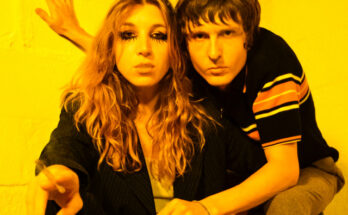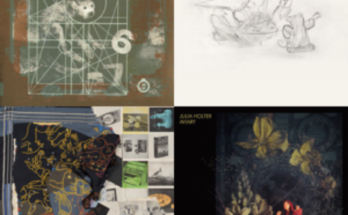When Duke Ellington came to Champaign-Urbana, he purchased a hat from Dan’s Hat Shop which became a signature for the performer. Many decades later, the store produced another unforgettable hat, mated to the boisterous personality and memorable laugh of Chef Ra. Ra has been wearing his “Mad Hatter” for more than 20 years, a hat that lightly mocks his floor-length dredlocks and natural flair. He isn’t just appearance though; he’s as proud of his soul and mind.
Chef Ra deals in consciousness, in the same spirit as hip-hop’s “conscious MCs.” Like those urban songwriters who look beyond themselves for inspiration, Ra looks to the dual muses of reggae culture for greater understanding.
“I think reggae pushes you to question things and not be such a follower,” he explains outside the WEFT 90.1 FM studio during his weekly radio show, which features two hours of roots and modern music from Jamaica. Some may know Chef Ra from not from the radio or his weekly DJ sets at Barfly, though: he contributes to High Times, the marijuana magazine that combines drug activism with the predictable gumption to feature “Jenna Jameson: Stoned!” Ra had the fortune to become involved with High Times when friend and writer Steve Hagar became editor of the publication.
“I said, ‘Hey man, I got a recipe to cook with marijuana,’ and he let me do an article.”
From there it took off; the “ganga gourmet” found himself writing a regular column and becoming involved with the causes associated with marijuana, appearing at rallies and creating dishes like his famous “rasta pasta.” Ra creates his recipes by simply experimenting. His creations, which often involve baking marijuana into the butter (and concealing the taste), aren’t purely for hedonistic purposes, though; Ra hopes that they could provide pleasure and relief to those too ill to smoke. On marijuana, Ra admits that drugs are not an aid to the unenlightened mind.
“I don’t think it’s a solution. There is no magic way-you’ve got to get your mind together.” Rather, drugs are a method for expanding the consciousness of those who are ready to learn.
“It’s a spiritual thing. It makes me think and analyze. It uplifts your soul. It’s a matter of consciousness-that’s the game I’m into.”
“Just being a black hippie,” Ra sought a lifestyle that fulfilled his desire for greater consciousness. While he was in college, reggae hadn’t gained notice in America. Originating from the faster ska, the genre had taken a name from Toots and the Maytals’ “Do the Reggae;” the roots were firmly planted but no one had noticed the soon-to-be king.
“I worked at the original Record Service, and the owner went down to Jamaica,” where he became aware of Bob Marley. Hearing the Catch A Fire LP for the first time, Ra had found his aesthetic; luckily, he was already ahead of the fashion. If you look on the cover of Catch A Fire, which features a photo of Bob Marley inhaling from a monstrous spliff, you’ll note that his hair is in fact not dredded but in an afro.
“I already had dredlocks back then-because I was just a dirty bohemian hippy. I was before the man [Bob Marley] himself,” Ra declares proudly.
“They’re not going deep into the roots of the music and seeing who was there when Bob Marley was there and playing,” Ra says, comparing it to discovering Elvis without Chuck Berry.
Reggae has gone through so many changes in the past 30 years; slick pop acts like Steel Pulse contrast with Toots’ decidedly-rootsy shuffles in ways that rival the development of American pop, but for the white American, reggae is thought of as a historical genre, neither contemporary nor self-aware.
“It’s been up and down and it goes in cycles. Certain generations are attracted by it, and originally, reggae wasn’t really even embraced by black people in America. It was all the white hippie kids that embraced reggae, the college kids. In this generation, I think, the younger blacks are more attuned to it. They see the heritage and they see the consciousnesses that are in reggae.”
Ra throws quite a party every Wednesday at Barfly, where he spins the roots of Jamaican music in with more modern sounds. Dub and dancehall, more rhythmic and bass-oriented genres derived from reggae, have informed Americans (and are often credited with the “invention” of rap), and Ra uses this more-popular music to teach the roots of Jamaican music to his listeners.
“I look at myself as a messenger for the music and for the lifestyle and for the consciousness involved. That’s my mission.”
Music this vital and aware isn’t like a lesson as much as a party, though. The good-spirited revelers compare the experience to “going to church,” but it’s a church that preaches individualism and love over the collective security usually associated with organized religion. After all, Chef Ra’s name isn’t a reference to “jazz alien” Sun Ra, or the Egyptian sun god. As he explains it:
“I’m more of a party man, so it’s ‘Ra Ra Ra sis boom ba’.”
There are two times every week to hear Chef Ra. Every Wednesday he DJs at Barfly. This is a no-cover, 19+ event beginning at 10 p.m.: expect to hear a broader swath of music not just from the Islands. Thursday nights, you can tune in to WEFT 90.1 FM to hear Ra host two hours of Jamacain music, starting at 8.



